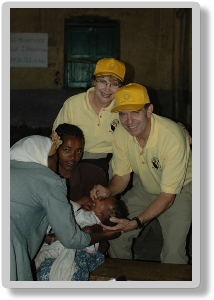|
||||||||||
 |
||||||||||||||||||||||||||
|
Vol. 17, No. 31, January 31, 2005 IN THIS ISSUE: This Reveille Home Page | The Friday Program: Ethiopia Revisited Doug Cameron | Valentine Dinner, February 12 | Rotary Youth Leadership Awards Seminar Program (RYLASP) | Friday Potpourri | Classification Talk: Alan Forney | New Member Inducted: Dan Geare | Student of the Month: Patrick Lloid | Web Fun |
||||||||||||||||||||||||||
|
||||||||||||||||||||||||||
|
The Friday Program: Accompanied by some wonderful pictures of their October 2004 trip, the Doug Cameron put a first-hand, eyewitness touch to another of Rotary’s crowning international achievements — the drive to eradicate polio from the earth.
Doug told how impressed he was when three of our members traveled to Ethiopia in the fall of 2003 to help immunize a portion of the Ethiopian population. Margie Burnett, Kim Shrader and Jim Owens went to Addis Ababa and came home with a moving story. “Penny LeGate’s documentaries also made a big impression on me ... I was inspired by these reports. Penny was on hand for this NID, too, and will be airing her program soon on KIRO-TV Channel 7.” Twenty years ago, Rotary International determined that its organization was just the group to spearhead the cause of eradicating polio. PolioPlus was born in 1985 when a “thousand kids a day were contracting the disease. Today, 99.5% of the globe is safe from polio. There have been no cases of polio in Ethiopia for two years, but neighboring Sudan still reports cases, mostly coming from another neighbor, Nigeria. India continues to rid itself of the last of its polio cases,” Cameron said. Ethiopia is a country in northeast Africa, twice the size of Texas. It has a population of 64 million people. Half of these are illiterate. Ethiopians are split evenly between Christian and Muslim faiths. About 85% of the country engages in agriculture, with the primary crops coffee and roses. Prior to the teams spreading out over the country for the immunization project, Rotarians, as well as ambassadors and community leaders all attended a visit at the Presidential palace, where the country’s 80-year-old President spoke to the nation by television so the population would learn about the polio eradication project. The task was to immunize 750,000 kids at 1250 sites throughout the country. The math works out to 600 immunizations per site. The Camerons were assigned an area west of the Ethiopian capital of Addis Ababa, near the Sudanese border. They were responsible for 95 different sites. The pictures of this area were breathtakingly beautiful. “This is a gorgeous country,” said Doug. “We went to thatched-roof homes in small hamlets to give our immunizations.” “We took bags of Beanie Babies, baby clothing, soccer items, toothpaste and other supplies to give as gifts to those families participating.” Many of the gifts came from BBRC Rotary families, including the Beanie Babies and soccer balls from Chad Fischer. Forty drops of vaccine are contained in each vial. Two drops takes care of a lifetime of protection, although there has been a project established to revisit each recipient over the next two years with some booster shots. Kids 0-5 years old received the oral drops, plus drops of Vitamin A. Each day the groups planned their daily activities, always mindful of the goal of 750,000 immunizations. There are five Rotary Clubs active in Addis Ababa. One is for French-speaking Rotarians. “We had a fabulous Ethiopian dinner at the French embassy where they served Bordeaux wine. Who was to think we’d be in the middle of Africa enjoying some of the world’s finest wine!” Members of area Rotaract Clubs worked as interpreters and accompanied the immunization teams on their rounds. “These college kids are a real hope for their country,” Cameron observed. The Cameron Team visited the town of Ambo, with a population of 40,000. “Our team of eight worked to sort out agenda each day. We went to incredibly remote areas. The kids were very well mannered. The vaccine was kept cold in these small coolers. We took the vaccine wherever crowds were told to gather ... in a school, under a tree, in a garage. The teachers had the kids all lined up when we arrived. After their drops, we gave them some of Chad’s soccer balls ... they were ecstatic! The documentation by the Rotary teams is meticulous. A system of using Jensen’s Violet on fingertips noted that a child had been immunized. (Not too different from the tattoo used during the recent Iraqi election). The Camerons traveled to their destinations in trucks, by horse-drawn carts, on a burro and even in a dugout canoe. In some cases, the immunization team went house to house because tradition says that infants do not go out of their homes until they’ve been christened. This may be as much as 40 days after their birth. Doug reviewed the impact that Rotary International has had in Ethiopia. “I got to dig postholes for a fence at the Yeka Taffo school, which is being built by a Rotary project. It was no different than an American project here is me with the shovel with five people watching!” Other important projects include dozens of water projects to deliver clean, drinkable water to villages. An estimated 500,000 people mostly children die annually from consuming contaminated water. Wells are being built all over the country. The Cheshire Center is a place where youngsters who’ve contacted polio have some hope for a normal life. This Rotary-sponsored project houses 70 polio-stricken kids where they undergo surgery on their legs. The surgical techniques employed by many Rotarian doctors have these kids walking again. Another Rotary project is an orphanage for AIDS victims. The Rotary teams disbursed clothes to kids at this site. They visited the new Library supported by University Rotary Club stocked with books from the UW and Seattle library. Two other successful projects include the Village School and the miraculous work of Dr. Katherine Hamblin at her Fistula Clinic. It was obvious the Cameron’s returned home deeply impressed by what they saw and the Ethiopian people they came in contact with. Such is the impact that Rotary has, not only to those we serve, but to those doing the serving. It brings new meaning to “Service Above Self” and we thank Doug and Connie for sharing their journey with us. A certificate was presented to Doug noting that the BBRC had donated 1220 pounds of fresh produce in his name to area food banks through Rotary First Harvest. Thanks to Doug for his self introduction.
|
||||||||||||||||||||||||||
 |
||||||||||||||||||||||||||
 |
||||||||||||||||||||||||||
|
CLICK HERE |
||||||||||||||||||||||||||
|
Reveille | Reveille Archives | Meeting Information | Calendar | How to Join the BBRC | Officers & Directors | Committees | Online Member Directory | Short Directory PDF File | Directory Info Form | Set Up User Info | Forgot User Info | Meeting Make-Up Form | Attendance Statistics | New Member Application (PDF File) | Expense-Funding Request Form (PDF File) | Rotary Foundation Pledge Form | District 5030 Website & Newsletter | 2004 Raffle Winner | About the Raffle | Email Us DISTRICT 5030 CLUB INFORMATION |
||||||||||||||||||||||||||

